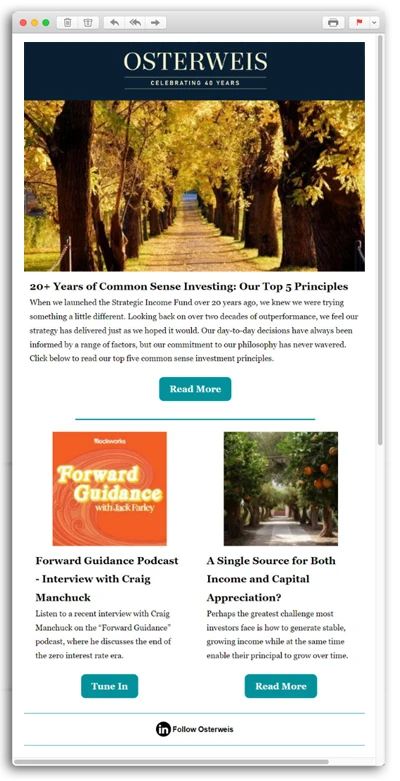Overview
Our core equity strategy invests primarily in common stocks of quality growth companies that the Osterweis Capital Management investment team believes offer superior investment value and opportunity for growth. The team focuses on a select group of companies that it believes have durable competitive advantages, attractive growth prospects, and strong management teams. The team seeks to invest in these businesses when they are undervalued or underappreciated by the market.
Minimum Investment
$5 million
More Information
Call us at (415) 434-4441 or email at contact@osterweis.com.
Account Details
In our separately managed core equity accounts, clients own a portfolio of securities. For these accounts we are able to customize each portfolio based on individual needs such as equity exposure levels, legacy positions, specific investment restrictions, income needs, etc. that may not be met by a mutual fund.
Performance
Core Equity Composite (as of 9/30/25)
In our Core Equity accounts Osterweis has the discretion to decrease or increase equity exposure in an effort to reduce risk.
| QTD | YTD | 1 YR | 3 YR | 5 YR | 7 YR | 10 YR | 15 YR | 20 YR | INCEP (1/1/1993) |
|
|---|---|---|---|---|---|---|---|---|---|---|
| Core Equity Composite (gross) | 4.04% | 8.90% | 8.44% | 17.40% | 10.51% | 11.32% | 11.08% | 10.73% | 9.00% | 11.36% |
| Core Equity Composite (net) | 3.79 | 8.11 | 7.40 | 16.27 | 9.43 | 10.23 | 10.00 | 9.64 | 7.91 | 10.21 |
| S&P 500 Index | 8.12 | 14.83 | 17.60 | 24.94 | 16.47 | 14.45 | 15.30 | 14.64 | 10.97 | 10.80 |
Philosophy
We believe a carefully selected portfolio of competitively advantaged businesses purchased at attractive valuations is key to generating attractive long-term investment returns.
We seek to purchase shares in quality growth companies when their growth opportunities are underappreciated and not properly discounted in their current market value. We identify quality growth companies based on the durability of their competitive advantages, the opportunity for reinvestment to drive future growth, and management proficiency. We believe that business quality, valuation, and capital structure are key variables in supporting a “margin of safety” for an investment idea. In this vein, an ideal potential investment is a quality growth company that can be bought at an attractive valuation. If our investment thesis proves out, we have purchased superior growth at a reasonable price. If our thesis is wrong, we still own a quality business and the downside to our investment should be somewhat limited.
Our research process places a strong emphasis on identifying the source of a company’s competitive advantage and underwriting the durability of that competitive advantage. As a result, we focus our research on industry structure to ensure a deep understanding of competitive threats within an industry and growth prospects for each sector. Ultimately, we seek companies that can sustainably grow free cash flow per share while earning attractive and/or improving returns on capital. Governance, management incentives, and corporate culture are also critical focus areas for our research.
Past performance does not guarantee future results.
Rates of return for periods greater than one year are annualized. The information given for these composites is historic and should not be taken as an indication of future performance. Performance returns are presented both before and after the deduction of advisory fees. Account returns are calculated using a time-weighted return method. Account returns reflect the reinvestment of dividends and other income and the deduction of brokerage fees and other commissions, if any, but do not reflect the deduction of certain other expenses such as custodial fees. Monthly composite returns are calculated by weighting account returns by beginning market value. Net returns reflect the deduction of actual advisory fees, which may vary between accounts due to portfolio size, client type, or other factors. From 1/1/2021 onward, net returns also reflect mutual fund fee waivers in certain periods.
The S&P 500 Index is widely regarded as the standard for measuring large cap U.S. stock market performance. The index does not incur expenses, is not available for investment, and includes the reinvestment of dividends. The S&P 500 Index data are provided for comparison of the composite’s performance to the performance of the stock market in general. The S&P 500 Index performance is not, however, directly comparable to the composites’ performance because accounts in the composites generally invest by using a portfolio of 30-40 stocks and the S&P 500 Index is an unmanaged index that is widely regarded as the standard for measuring U.S. stock market performance.
The fee schedule is as follows: 1.25% on the first $10 million, 1.00% on the next $15 million up to $25 million, and 0.75% in excess of $25 million. A discounted, institutional rate is available.
Clients invested in separately managed core equity accounts are subject to various risks including potential loss of principal, general market risk, small and medium-sized company risk, foreign securities and emerging markets risk and default risk. For a complete discussion of the risks involved, please see our Form ADV Brochure and refer to Item 8.
The Core Equity Composite includes all fee-paying separately managed accounts that are predominantly invested in equity securities, and for which OCM has the discretion to increase and decrease equity exposure in an effort to reduce risk. The non-equity portion of the account may be invested in cash equivalents, fixed income securities, or mutual funds. Individual account performance will vary from the composite performance due to differences in individual holdings, cash flows, etc.








